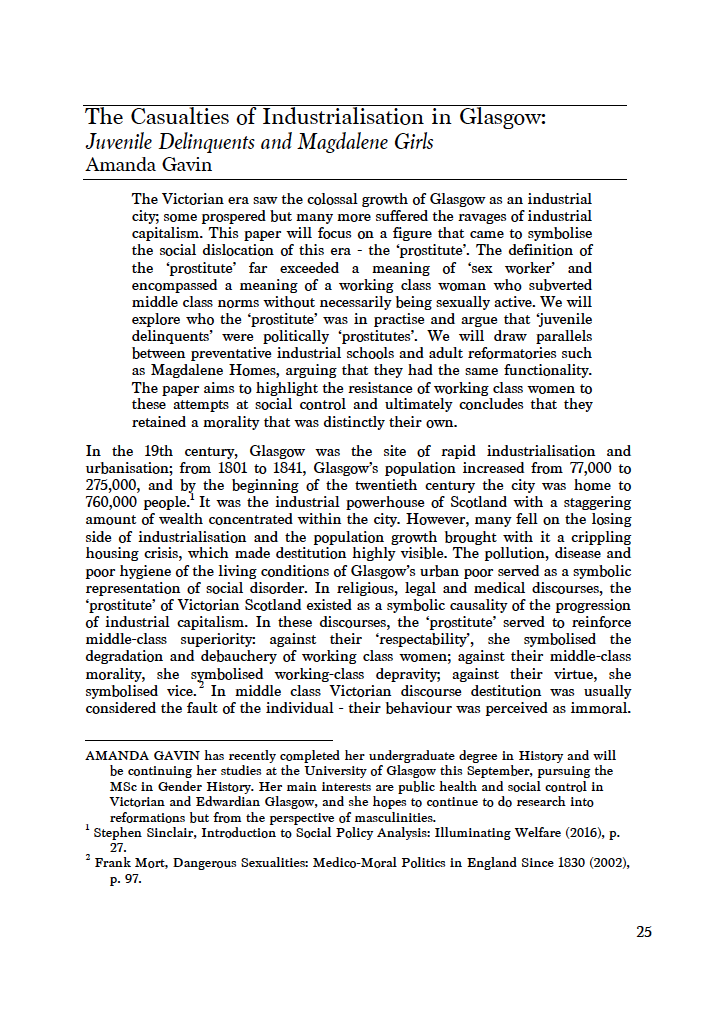The Casualties of Industrialisation in Glasgow
Juvenile Delinquents and Magdalene Girls
DOI:
https://doi.org/10.36399/GroundingsUG.10.185Keywords:
Glasgow, Victorian Era, Sex work, Prostitution, Juvenile Delinquency, Magdalene Girls, IndustrialisationAbstract
The Victorian era saw the colossal growth of Glasgow as an industrial city; some prospered but many more suffered the ravages of industrial capitalism. This paper will focus on a figure that came to symbolise the social dislocation of this era - the ‘prostitute’. The definition of the ‘prostitute’ far exceeded a meaning of ‘sex worker’ and encompassed a meaning of a working class woman who subverted middle class norms without necessarily being sexually active. We will explore who the ‘prostitute’ was in practise and argue that ‘juvenile delinquents’ were politically ‘prostitutes’. We will draw parallels between preventative industrial schools and adult reformatories such as Magdalene Homes, arguing that they had the same functionality. The paper aims to highlight the resistance of working class women to these attempts at social control and ultimately concludes that they retained a morality that was distinctly their own.
References
GCU, print 881,‘Glasgow Reformatory for Girls at East Chapelton, Bearsden’, Glasgow c.1890.
GCA, AGN 2114, ‘The Dark Side of Glasgow’, North British Daily Mail, December 1870-January 1871.
GCA, C67, ‘Woman With Naked Baby, Slum Interior’, Glasgow, no date, c.1910.
GCA,D-ED 7/146/2, ‘Register of the Glasgow Industrial School’.
GCA, DTC 14/1/48 55A, ‘House of Refuge and Reformatories Inspectors Reports 1899’, Glasgow 1899.
GCA, P1891, ‘Glasgow Juvenile Delinquency Board’, Glasgow 1886.
GCA, TD 1577 1/1, ‘Homes Committee Notes Minute Book No. 2, 1860-1862’, Glasgow 15 August 1860.
PAC, RG 76 C-4542 3661, ‘Passenger Lists of the Buenos Ayrean Arriving in Quebec and Montreal on 1898-07-12’.
PAC, RG 76 Volume 119 File 22968, ‘Glasgow Juvenile Delinquency Prevention and Repression Act 1878’.
UGRA, Ba4-d.10, ‘Report of the Glasgow Boy’s House of Refuge, Duke Street 1854-1864’.
GUSC, sp coll BG54-c.11, ‘The Fifth Annual Report 1865 The Glasgow Magdalene Institution’, Glasgow 1865.
‘Another Industrial School Scandal’, The Dundee Courier & Argus, 19 November 1881; Issue 8843.
‘Glasgow Industrial School Scandal’, The Dundee Courier & Argus and Northern Warder, 6 January 1882, Issue 8884.
‘Wanted: The Truth About Pauperism’, Glasgow Herald, 30 December 1891.
Anon, The Post Office Glasgow Directory, (Glasgow: 1881).
Anon, The Post Office Glasgow Directory, (Glasgow: 1882).
Anon, Handbook of Glasgow Charitable and Beneficent Institutions (Glasgow: 1907).
Bryce, J.D, The Glasgow Magdalene Asylum, Its Past and Present: With Relative Facts and Suggestions (Glasgow: 1859).
Irwin, Margaret H, The Condition of Women’s Work in Laundries Report of an Inquiry Conducted for the Council of the Women’s Protective and Provident League of Glasgow (Glasgow: 1893).
Blaikie, Andrew ‘Scottish Illegitimacy: Social Adjustment or Moral Economy?’, The Journal of Interdisciplinary History 29:2 (1998), pp. 221-41.
Kohli, Marjorie, The Golden Bridge: Young Immigrants to Canada 1833-1939 (Toronto: 2003).
Littlewood, Barbara, Mahood, Linda ‘Prostitutes, Magdalenes and Wayward Girls: Dangerous Sexualities of Working Class Women in Victorian Scotland’, Gender & History 3:2 (1991) pp. 549-578.
Mahood, Linda, The Magdalenes: Prostitution in the nineteenth century (NewYork: 1990).
Mort, Frank, Dangerous Sexualities: Medico-Moral Politics in England Since 1830 (2002).
Sinclair, Stephen, Introduction to Social Policy Analysis: Illuminating Welfare (2016).
Walkowitz, Judith, Prostitution and Victorian society: Women, class, and the state (Cambridge:1982).
Weeks, Jeffrey, Sex, Politics and Society the Regulation of Sexuality since 1800 (2012).

Downloads
Published
Issue
Section
License
Copyright (c) 2017 Amanda Gavin

This work is licensed under a Creative Commons Attribution 4.0 International License.
The CC BY 4.0 license is a Creative Commons license. This is a non-copyleft free license that is good for art and entertainment works, and educational works. It is compatible with all versions of the GNU GPL; however, like all CC licenses, it should not be used on software. People are free to: Share — copy and redistribute the material in any medium or format; Adapt — remix, transform, and build upon the material for any purpose, even commercially. The licensor cannot revoke these freedoms as long as you follow the license terms. But they must conform to the following terms: Attribution — You must give appropriate credit, provide a link to the license, and indicate if changes were made. You may do so in any reasonable manner, but not in any way that suggests the licensor endorses you or your use. No additional restrictions — You may not apply legal terms or technological measures that legally restrict others from doing anything the license permits.
Please check individual article PDF copies to see if any additional restrictions apply.







